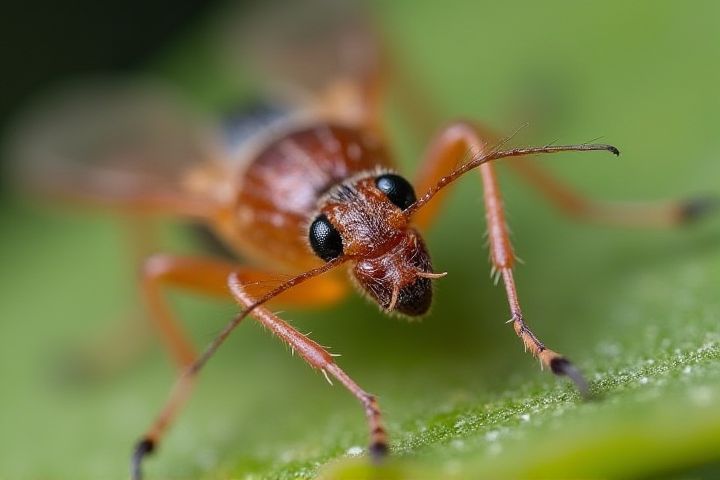
Implementing effective house pest prevention strategies is essential for maintaining a healthy living environment. Regularly sealing cracks and gaps in windows, doors, and foundations can significantly reduce entry points for pests like ants and rodents. Keep your kitchen clean by storing food in airtight containers and disposing of waste properly to deter insects and rodents. Maintaining proper drainage and reducing standing water around your home not only prevents mosquitoes but also discourages other pests that thrive in damp areas. Finally, consider incorporating natural repellents, such as peppermint oil or vinegar solutions, to keep pests at bay without harmful chemicals.
Can House Pests Be Prevented
Maintain cleanliness
Maintaining cleanliness is essential in preventing house pests, as pests are often attracted to food debris and clutter. Regularly sweeping, vacuuming, and mopping floors can eliminate potential food sources for insects like ants and cockroaches. Keeping kitchen countertops, dishes, and appliances clean and free of crumbs is crucial for pest control. Additionally, ensuring that trash is regularly disposed of in sealed bins reduces the likelihood of attracting rodents and other household pests.
Seal entry points
Sealing entry points is essential for preventing house pests from infiltrating your home. Common vulnerable areas include gaps around windows, doors, and utility openings, which can be sealed with caulk, weather stripping, or door sweeps. Regular inspections of your property can help identify and seal these entryways before pests like rodents, ants, and spiders gain access. By reinforcing these barriers, you enhance your home's defenses, making it less inviting for unwanted intruders.
Store food properly
Store food properly to create a less inviting environment for house pests. Use airtight containers made of glass or plastic to keep grains, snacks, and other perishables protected from insects and rodents. Ensure your pantry is organized and free of spills, as crumbs attract unwanted visitors; regular cleaning can reduce the risk of infestations. By managing food storage effectively, you decrease the likelihood of pests like ants, cockroaches, and mice invading your space.
Maintain dryness
Maintaining dryness in your home is crucial for effective house pest prevention, as most pests thrive in damp environments. Ensure areas like basements, bathrooms, and kitchens are well-ventilated and use dehumidifiers in moisture-prone spaces to keep humidity levels below 50%. Regularly inspect and repair leaks in plumbing to eliminate standing water, which attracts pests. Sealing cracks and crevices in walls and around windows also helps restrict pest entry, creating a less inviting habitat for unwanted guests.
Regular inspections
Regular inspections of your home can significantly reduce the risk of pest infestations. It is advisable to conduct these inspections every three months, focusing on commonly affected areas such as basements, attics, and entry points. Look for signs of pests, including droppings, nests, or damage to wood structures, as these can indicate a potential problem. By identifying and addressing issues early, you can save on pest control costs and maintain a healthier living environment.
Install screens
Installing screens on windows and doors is an effective method to prevent house pests from entering your home. High-quality, durable screens can minimize the chances of insects like mosquitoes and flies infiltrating your living spaces, reducing the risk of potential diseases carried by these pests. Make sure your screens fit snugly and have no visible holes or tears, as even small openings can allow pests to enter. With proper installation and maintenance of window and door screens, you can create a barrier that significantly enhances your home's pest control measures.
Use natural repellents
Using natural repellents can effectively prevent house pests without relying on harmful chemicals. Essential oils, such as peppermint, lavender, and eucalyptus, can deter insects while also leaving a pleasant fragrance in your home. You can create sprays by diluting these oils in water and applying them to entry points and infested areas. Incorporating natural repellents into your pest management strategy not only safeguards your living space but also promotes a healthier environment for you and your family.
Proper waste management
Proper waste management is essential in preventing house pests, with around 60% of pest infestations linked to improper waste disposal. Regularly securing trash in sealed, plastic containers can drastically reduce access for pests like rodents and insects. Composting organic waste correctly ensures that it doesn't attract unwanted critters, while frequent cleaning of garbage areas minimizes lingering odors that can lure pests. Implementing these waste management practices can significantly enhance your home's pest control efforts, protecting your living environment and improving overall hygiene.
Declutter spaces
Decluttering your spaces is a crucial step in preventing house pests. By removing excess items and maintaining organized areas, you minimize potential hiding spots that attract insects and rodents. Regularly clearing out clutter also helps you identify any early signs of infestation, allowing for timely intervention. Implementing a consistent decluttering routine enhances your home's overall hygiene, significantly reducing the likelihood of pest problems.
Professional pest control
Professional pest control services significantly reduce the risk of house pests, utilizing targeted approaches to identify and eliminate infestations. By employing trained technicians who use integrated pest management strategies, you can effectively protect your home from over 700 species of pests, including rodents, termites, and ants. Regular inspections, often scheduled quarterly or bi-annually, ensure early detection of potential issues, helping maintain a pest-free environment. With the average cost of professional pest control ranging from $100 to $300 per treatment, investing in these services can save you from extensive damage and costly repairs later.
